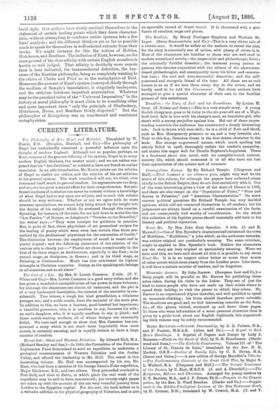CURRENT LITERATURE.
The Philosophy of Art : Hegel and Michelet. Translated by W. Hastie, B.D. (Simpkin, Marshall, and Co.)—The philosophy of Hegel has undoubtedly exercised a powerful influence upon the thought of modern England. Although not so popular, perhaps, as Kant, because of the greater difficulty of his system, Hegel is, to many modern English thinkers, the master mind ; and we are rather sur- prised that his " Art-Criticism," or aesthetics, have not found an earlier translator. In an able introduction, Mr. Hastie points out the relation of Hegel to earlier art critics, and the relation of his art-criticism to his general system. The work translated will not, we think, ever commend itself much to general readers. Its arguments are too deep, and require too great a mental effort for their comprehension. But pro- fessed students of mathetics can never be content without a knowledge of what Hegel had to say upon the subject, and to such this volume should be very welcome. Whether or not we agree with its more abstruse speculations, we cannot help being struck by the insight into the depths of his subject which lie scattered through this treatise. Speaking, for instance, of the rules for art laid down in works like the "Ars Poetics" of Horace, or Longinus's "Treatise on the Beautiful," the writer says :—" They were receipts for guidance in practice. But, in point of fact, these physicians of art prescribed recipes for the healing of poetry which were even less certain than those pre- scribed by the professional physicians for the restoration of health." The distinction between the employment of sound in music and in poetry is good ; and the following statement of the relation of the various arts is clearly put :—" Plastic art shone conspicuously in the first of its three stages, as Architecture, especially in the East ; in its second stage, as Sculpture, in Greece ; and in its third stage, as Painting, in Christendom. Music has also celebrated its highest triumphs in Christian countries. Poetry, as the speaking art, belongs to all countries and to all times."


































 Previous page
Previous page